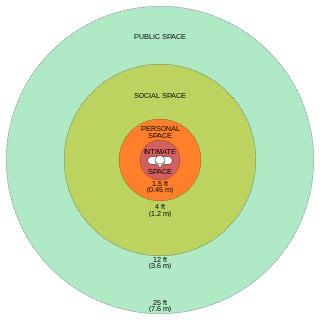Related Research Articles

Social science is one of the branches of science, devoted to the study of societies and the relationships among individuals within those societies. The term was formerly used to refer to the field of sociology, the original "science of society", established in the 19th century. In addition to sociology, it now encompasses a wide array of academic disciplines, including anthropology, archaeology, economics, human geography, linguistics, management science, communication science, political science and psychology.

In research design, especially in psychology, social sciences, life sciences and physics, operationalization or operationalisation is a process of defining the measurement of a phenomenon which is not directly measurable, though its existence is inferred by other phenomena. Operationalization thus defines a fuzzy concept so as to make it clearly distinguishable, measurable, and understandable by empirical observation. In a broader sense, it defines the extension of a concept—describing what is and is not an instance of that concept. For example, in medicine, the phenomenon of health might be operationalized by one or more indicators like body mass index or tobacco smoking. As another example, in visual processing the presence of a certain object in the environment could be inferred by measuring specific features of the light it reflects. In these examples, the phenomena are difficult to directly observe and measure because they are general/abstract or they are latent. Operationalization helps infer the existence, and some elements of the extension, of the phenomena of interest by means of some observable and measurable effects they have.
Distributed cognition is an approach to cognitive science research that was developed by cognitive anthropologist Edwin Hutchins during the 1990s.
Social representations are a system of values, ideas, metaphors, beliefs, and practices that serve to establish social order, orient participants and enable communication among the members of groups and communities. Social representation theory is a body of theory within social psychology and sociological social psychology. It has parallels in sociological theorizing such as social constructionism and symbolic interactionism, and is similar in some ways to mass consensus and discursive psychology.

Serge Moscovici was a Romanian-born French social psychologist, director of the Laboratoire Européen de Psychologie Sociale, which he co-founded in 1974 at the Maison des sciences de l'homme in Paris. He was a member of the European Academy of Sciences and Arts and Officer of the Légion d'honneur, as well as a member of the Russian Academy of Sciences and honorary member of the Hungarian Academy of Sciences. Moscovici's son, Pierre Moscovici, was European Commissioner for Economic and Financial Affairs, Taxation and Customs.
Michael Billig is a British academic. He is Emeritus Professor of Social Sciences at Loughborough University, working principally in contemporary social psychology although much of his work crosses disciplinary boundaries in the social sciences.

Henri Tajfel was a Polish social psychologist, best known for his pioneering work on the cognitive aspects of prejudice and social identity theory, as well as being one of the founders of the European Association of Experimental Social Psychology.

The sociology of human consciousness or the sociology of consciousness uses the theories and methodology of sociology to explore and examine consciousness.

George Gaskell is a British Emeritus Professor of Social Psychology at the London School of Economics and Political Science (LSE). Formerly Director of the Methodology Institute, which he established with Colm O’Muircheartaigh, he was Pro-director for Planning and Resources and a member of the LSE Council and Court of Governors.
The Department of Psychological and Behavioural Science is a department in the London School of Economics and Political Science, founded in 1964. Prior to 2009, it was located within the Department of Sociology. Work undertaken at the Department strives to understand, through theoretical development and empirical research, the social processes that emerge at the intersection between the individual and wider societal contexts. Research focuses on social representations, health, community, culture, racism, ethnicity, communications and the media, organisational psychology, the social construction of technology, gender, economic psychology, sexuality, social identity, risk and society, and innovation and creativity in organisations and business.

Hildegard Therese Himmelweit was a German social psychologist who had a major influence on the development of the discipline in Britain.
Alexa Hepburn is professor of communication at Rutgers University, and honorary professor in conversation analysis in the Social Sciences Department at Loughborough University.

Wolfgang Wagner is an Austrian social psychologist, currently professor at the Department of Psychology at the University of Tartu, Estonia. Formerly he was at the Johannes Kepler University in Linz, Austria, and affiliated with the Department of Social Psychology and Methodology at the University of San Sebastián, Spain. He is renowned for his contributions to the Theory of Social Representations.
Cognitive polyphasia is where different kinds of knowledge, possessing different rationalities live side by side in the same individual or collective. From Greek: polloi "many", phasis "appearance".
Laboratory of Comparative Human Cognition (LCHC) is a social science laboratory located at the University of California, San Diego (UCSD) since 1978. Scholars at LCHC pursue research focused on understanding the complex relationship between cognition and culture in individual and social development. Such research requires collaboration among scholars from a variety of research disciplines, including cognitive science, education, linguistics, psychology, anthropology, and sociology. LCHC also functions as a research and training institution, arranging for pre-doctoral, doctoral, and post-doctoral training, as well as research exchanges with scholars throughout the world. In addition, LCHC sponsors a journal, Mind, Culture and Activity: An International Journal (MCA), and an open internet discussion group, XMCA.
The social sciences are the sciences concerned with societies, human behaviour, and social relationships.
Saadi Lahlou is Professor in Social Psychology, in the Department of Psychological and Behavioural Science at the London School of Economics. He conducts and publishes research in the areas of social psychology, consumer behaviour, survey and forecast methods, lexical analysis, cognition and design. He is the Director of the Paris Institute for Advanced Study
John Maze (1923–2008) was an Associate Professor of Psychology at the University of Sydney from 1951 to 1986. Recognised for his achievements in philosophy and psychology, he was awarded a Nuffield Foundation Travelling Fellowship with the University of London in 1958, and returned there as an Honorary Research Fellow in 1980. Maze's theoretical psychology extended from analyses of psychoanalytic metapsychology, to critique of concerns of psychology research of the day, including concepts of attitude, motivation, psychological homeostasis, psychological variables and social constructionism. Drawing on processes of conceptual and logical analysis, Maze sought to draw out logical inconsistencies and conceptual confusions apparent in theoretical psychological discourse. It is the logical structure of his theory and conclusions, as a function of a long connection with Andersonian realism which renders Maze's contribution as unique in theoretical psychology.
Robert Maclaughlin Farr was a social psychologist from Northern Ireland who played an important role in introducing social representation theory to Britain.
References
- ↑ Himmelweit, H.T., & Gaskell, G. (Eds). (1990). Societal psychology: Implications and scope. London: Sage.
- ↑ Laszlo, J. & Wagner, W. (Eds) (2003). Theories and Controversies in Societal Psychology. Budapest: New Mandate.
- ↑ Tajfel, H. (1981). Human Groups and Social Categories: Studies in Social Psychology. Cambridge: Cambridge University Press.
- ↑ Moscovici, S. (1976). Social Influence and Social Change. London: Academic Press.
- ↑ Moscovici, S. (2000). Social Representations - Explorations in Social Psychology (G. Duveen, Trans.). Cambridge: Polity Press.
- ↑ Wagner, W., & Hayes, N. (2005). Everyday Discourse and Common Sense - The Theory of Social Representations. Basingstoke: Palgrave-Macmillan.